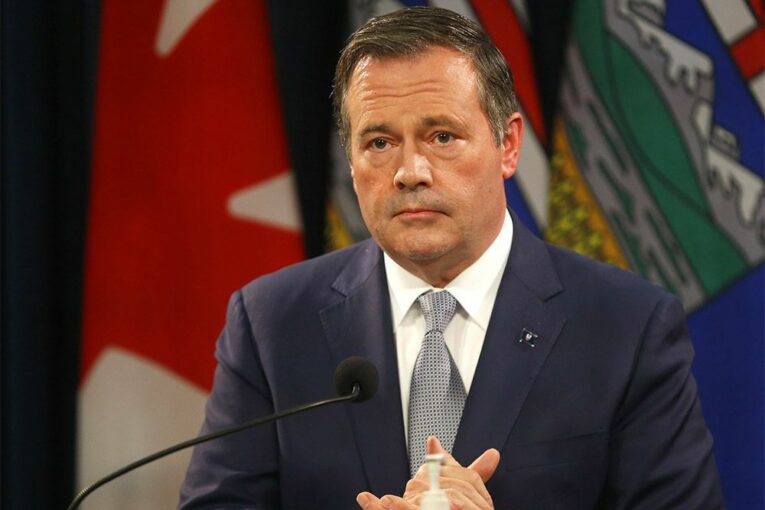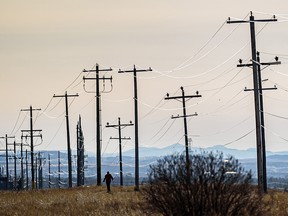
Sizzling electricity and natural gas prices are hitting consumers with a one-two punch in the pocketbooks these days.
Will it be enough to prompt the provincial government to intervene with a plan to buffer Albertans from the sting of higher energy bills?
Finance Minister Travis Toews is preparing the Feb. 24 provincial budget and all signs are pointing to electricity and gas costs remaining elevated this year.
The spot price for Alberta natural gas sat at $4.65 per gigajoule on Tuesday, up from $2.90 a year ago and $1.65 during the same period in 2020.
Meanwhile, Alberta power pool prices have remained high, averaging nearly $92 per megawatt-hour (MWh) so far this year.
In December, Premier Jason Kenney indicated his government was considering ways to assist consumers who are grappling with inflation and rising power and gas expenses.
On Tuesday, he confirmed the province is examining a return to natural gas rebates, which were in place almost 20 years ago.
“We have been looking at a potential rebate on natural gas prices should they reach a very high level,” he told reporters.
“There has been a significant increase. We’re watching that very closely. And if these prices go significantly higher, we are prepared to provide some support as has happened in Alberta in the past.”
Premiers Ralph Klein and Rachel Notley provided either rebates or installed rate caps to deal with rising residential electricity or natural gas expenditures in the past two decades.
Klein’s government, for example, offered monthly gas rebates in the early 2000s whenever the commodity rose above $5.50 per gigajoule. The gas rebate programs were in place, on and off, between 2001 and 2009.
Adjusted for inflation and based on what the Klein government provided, Alberta’s new rebate “would kick in at about $6.50 (per gigajoule) — above where we are now. So we’ve done work on that,” Kenney added.
Analysts are expecting strong markets for oil, natural gas and electricity this year as demand increases and the economy picks up.
A report by BMO Capital Markets analyst Ben Pham last week estimated Alberta wholesale power prices will average $80 per megawatt-hour (MWh) this year. He noted marginal costs are rising, “supply remains tight with coal retirements and demand should further rise as COVID-19 restrictions ease.”
Electricity prices averaged $102 per MWh last year, more than double the Alberta power pool price of $46.72 seen in 2020.
As the province continues to move off of coal and use more natural gas for power generation, the two energy commodities will be more tightly connected, said Duane Reid-Carlson, chief executive of electricity consultancy EDC Associates.
He expects power prices will average around $90 per MWh this year.
“It is going to hit people in the pocketbooks,“ Reid-Carlson said.
“The good news is it will be a little less than last year . . . but in the long run, it will be a higher cost for energy, which will underpin some amount of inflation.”

Consumers are already feeling the bite.
The regulated rate option price on electricity for Enmax customers in February (accounting for energy charges only, not billing and delivery costs) is increasing to 16.52 cents per kilowatt-hour, up from 8.76 a year earlier.
Natural gas prices have also been rising.
Gas demand is increasing as economies reopen, LNG export levels from the United States are strong, and cold winter weather is boosting consumption and prices, said analyst Jeremy McCrea of Raymond James.
Meanwhile, producers are not spending as much money on drilling to ramp up output as they did in the past when prices surged.
“These natural gas bills are definitely going higher,” McCrea said. “If you use a lot of gas, you will be paying the price.”
And that puts the ball smack in the UCP government’s court, while its energy royalties balloon and economists say it could deliver a balanced budget later this month.
In an interview with Herald political columnist Don Braid in December, Kenney said inflation was a significant issue and the province was “prepared in principle” to introduce a program to protect people from significant spikes in gas and electricity prices.
The NDP has called for the province to step in to help consumers. Opposition Leader Rachel Notley told Braid “the NDP would do the very thing we have a record of having done in the past, which was put a cap on electricity . . . It is possible to control utility prices. We already did it.”
But what’s the best way to do it?
Energy economist Blake Shaffer of the University of Calgary said he often jokes that Albertans have a love-hate relationship with energy rates — cheering on higher oil and gas prices for the province, but growing irate when it hits their wallets.
He recommends consumers get on fixed-price contracts for electricity and gas, and believes the province could do a better job promoting and educating consumers about their options.
Shaffer is less enamoured with introducing an across-the-board government program that interrupts the price signal encouraging people to consume less, preferring initiatives that protect the most vulnerable.
“What we can’t accept is people struggling to pay their bills and having to worry about losing access to utility services,” he said.
“We have a certain amount of fiscal capacity. Do we simply want to write cheques to every household across the province? I’m not sure that is the best use of our funds versus targeted supports.”
If the province decides to move ahead on a rebate program, the details will likely come during the budget.
Given the outlook for natural gas and power prices, it’s one line item in the financial plan that weary consumers will be looking for on Feb. 24.
Chris Varcoe is a Calgary Herald columnist.
You can read more of the news on source
